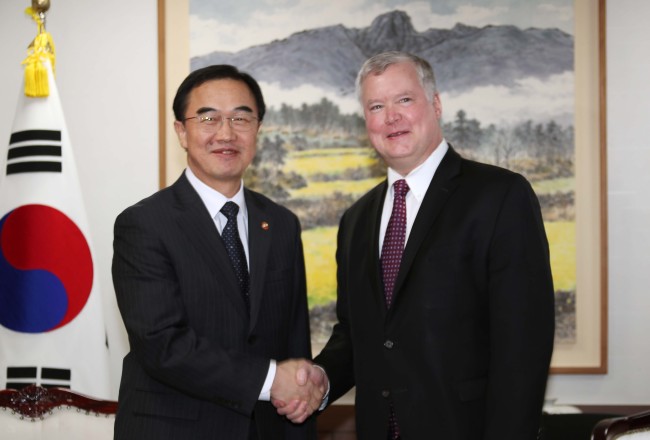The top US nuclear envoy reaffirmed that Washington and Seoul were on the same page on achieving the denuclearization of North Korea, amid concerns about possible discord between the allies over the pace of developments in inter-Korean relations.
“We want the same thing for the Korean Peninsula -- peace and stability, primarily denuclearization of North Korea,” Stephen Biegun, US special representative for North Korea, said before entering a meeting with Unification Minister Cho Myoung-gyon.
 |
Unification Minister Cho Myoung-gyon (left) shakes hands with Stephen Biegun, the US special representative for North Korea, at the central government complex in Seoul on Tuesday. (Yonhap) |
“Within that, there are many initiatives that we can cooperate on and we are looking forward to working closely between the ministry and the US,” he added.
According to the Ministry of Unification, the two sides exchanged opinions on the current situation surrounding the Korean Peninsula and issues concerning denuclearization in the meeting that lasted 30 minutes. Biegun stressed that the US will actively cooperate in creating a simultaneous progress in achieving North Korea’s denuclearization, peace regime on the peninsula and progress in inter-Korean ties.
Before the meeting, Cho noted that since their first and latest meeting on Sept. 11, there had been a lot of “work in progress” between the two Koreas, including the inter-Korean summit held last month in Pyongyang.
Cho pointed to the interactions between the US and North Korea, saying, “To my knowledge, there have been various interactions between the North and the US (as well), after Secretary of State Mike Pompeo and representative Biegun visited Pyongyang (on Oct. 7),” and adding that the allies had arrived at a “crucial point.”
Biegun’s trip to Korea came amid growing concern in the US that the Seoul government is actively pursuing inter-Korean projects without tangible progress on denuclearization.
South Korea has been working to get sanctions exemptions for a slew of inter-Korean projects, including the modernization of cross-border railways and roads, and improvements to tree nurseries in the North to help the communist nation’s reforestation efforts.
Despite the Seoul government’s desire to move the projects forward as smoothly as possible, the projects face a number of stumbling blocks over what experts interpret as a gap between the two allies’ perceptions of the seemingly rapid progress on inter-Korean projects.
At high-level talks earlier this month, the two Koreas agreed to resume on-site surveys of the western Gyeongui railway in late October and the Donghae railway along the east coast in November. They had failed to conduct a test operation of trains in August when the US-led United Nations Command refused to approve the plan that Seoul submitted, citing “procedural” problems.
Specific dates for the joint field survey and a number of meetings concerning other exchanges have yet to be set.
Cho admitted during a parliamentary audit on Monday that the lackluster progress on the railway project was due to areas where the South and the US had “slightly different views.”
Washington has stressed that the sanctions will remain intact until the North completely gives up its nuclear and missile programs.
Biegun’s meeting with Cho follows talks with his South Korean counterpart, Lee Do-hoon, and South Korean Foreign Minister Kang Kyung-wha on Monday, where the US envoy repeatedly underscored the need for close coordination and consultations between the allies in achieving denuclearization.
Biegun also met with Chief Presidential Secretary Im Jong-seok on Monday and was to meet with National Security Office Chief Chung Eui-yong later Tuesday.
It also comes on the heels of Lee Do-hoon’s visit to Washington a week ago, which observers say was part of US efforts to keep progress in inter-Korean relations in tandem with progress in denuclearization.
Meanwhile, a group of businessmen who operated factories at the now-shuttered Kaesong industrial park expressed disappointment at the “likely delay” of their visit to the North’s border town to check on their properties, based on an assessment of the current situation surrounding Washington-Seoul talks, a group member said. Anticipation surrounding their possible trip had been building up after the Seoul government announced it was planning to allow the businessmen to visit Kaesong as early as this week.
If the trip to North Korea does take place, it will be the first time for the businessmen to set foot in the complex since February 2016. But there were concerns that the move could be interpreted as Seoul’s disregard for international sanctions layered against the North, as the complex was shuttered on suspicion of being a source of hard currency for Pyongyang’s nuclear weapons program.
By Jung Min-kyung(
mkjung@heraldcorp.com)








